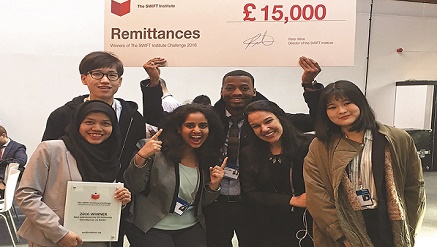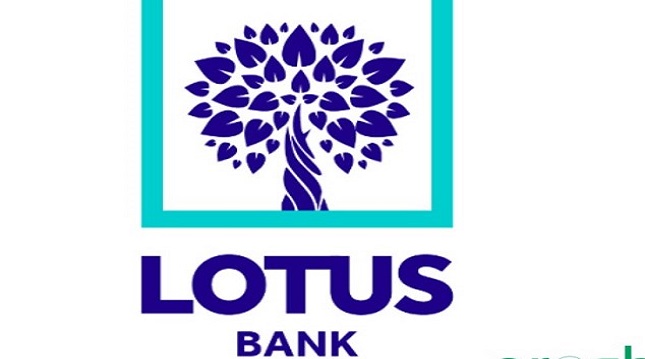News
Nigerian, Team Mates Win £15,000 at SWIFT Fintech Competition

Nigerian Mohammed Dankwambo will share £15,000 with five other university students after their Fintech idea wowed judges at the SWIFT Business Forum London.
The team called HADU from the UK’s Warwick Business School (WBS) beat six other teams – including three more from WBS – in the final to win the inaugural SWIFT Institute Challenge.
Mohammed, of Gombe, Nigeria, and team-mates Fiza Hussain, Sneha Sunkara, Yunjing Li, Yat Hung To and Qotrun Nada Haroen, were presented with the cheque by Harriett Baldwin, Economic Secretary to the Treasury, and they also won a trip to Sibos, the annual financial services event held in Geneva this September by SWIFT (Society for Worldwide Interbank Financial Telecommunication) – the global network that enables financial institutions to send and receive information about financial transactions.
Tasked with identifying a solution to address the challenge of remittances via banks in the UK, HADU presented a solution that focused on using near sound data technology to deliver mobile money and a network of branded high-security buses to do the ‘last mile’ and deliver the cash in Indonesia.
Mohammed said: “We were so excited when we heard our name on stage, even after one day, we still can’t believe it. We are very happy and really looking forward to further develop our idea.”
“This is a great win for WBS and the University that reflects the quality of the research and teaching at Warwick,” said Markos Zachariadis, Assistant Professor of Information Systems Management & Innovation and co-author of The Society for Worldwide Interbank Financial Telecommunication (SWIFT): Cooperative governance for network innovation, standards, and community.
“The SWIFT Institute Challenge has provided a great opportunity for students to work on real issues from the financial industry. Congratulations to all the finalists and to the winning team. We are very proud of the students.
“Our Fintech module at the school is part of our MSc in Information Systems Management & Innovation course and has been going for three years now, with our graduates landing jobs in major financial institutions and already making an impact.
“We will seek to develop more Fintech initiatives in the coming years.”
The 2016 Challenge was open to any UK-based recognised university, or centre of learning, with an interest in banking and asked students for a solution that would enable someone to send money from their UK bank account to an individual in a country where there is little or no banking infrastructure.
Held at the Tobacco Dock in London, each team was given 10 minutes to pitch their idea to the judges who came from across the financial services industry.
They took on teams from King’s College London, Queen Mary University of London and London School of Economics and Politics, with HADU coming out on top.
HADU will have their travel and expenses paid for to attend SWIFT’s annual financial services event, Sibos, and the opportunity to pitch their developed solution at the conference in Switzerland.
Commenting on the Challenge, Ms Baldwin said: “Innovation in payments solves real-world problems and has the ability to change how we, as consumers, interact with our money. That’s why it’s so exciting to see the projects from today’s SWIFT competition teams looking at how we can make remittances easier, cheaper and more efficient for people in the UK and around the world.
“Financial technology plays a vital role in stimulating greater competition, improving access and helping to drive transaction costs down. That’s just one of the many reasons the Government is doing all it can to support the UK’s dynamic Fintech sector.”
Peter Ware, Director at SWIFT Institute, said: “This is the first year for the Challenge, and we have been very impressed by the quality of the submissions and presentations from the UK Universities involved.
“An interest in banking is important but equally, so is an enthusiasm for devising new and cutting-edge ideas that could really make a difference. They all understand important world issues and are able to think outside the barriers that can exist in a corporate mindset.”
News
Microplastics Found in 90 Percent of Prostate Cancer Samples

Microplastics have now been found inside most prostate cancer tumors — and at strikingly higher levels than in healthy tissue.

A new study reports that tiny plastic particles were present in nine out of 10 men diagnosed with prostate cancer.
Researchers also found that these fragments appeared in greater amounts inside cancerous tumors than in nearby noncancerous prostate tissue.
The investigation was conducted at NYU Langone Health, including its Perlmutter Cancer Center and Center for the Investigation of Environmental Hazards.
Scientists set out to examine whether exposure to microplastics could play a role in the development of prostate cancer, which the American Cancer Society identifies as the most common cancer affecting American men.
Plastic used in food containers, packaging, cosmetics, and other everyday products can break down into microscopic pieces when heated, worn down, or chemically altered.
These particles can be swallowed, inhaled from the air, or absorbed through the skin. Previous research has detected microplastics throughout the human body, including in major organs, bodily fluids, and even the placenta.
Despite their widespread presence, scientists still do not fully understand their health effects.
For this study, researchers analyzed prostate tissue samples from 10 patients undergoing surgery to remove the prostate gland. Microplastic particles were identified in 90% of tumor samples and in 70% of noncancerous samples.
Notably, tumor tissue contained significantly more plastic.
On average, cancerous samples had about 2.5 times the concentration found in healthy prostate tissue (about 40 micrograms of plastic per gram of tissue compared with 16 micrograms per gram).
“Our pilot study provides important evidence that microplastic exposure may be a risk factor for prostate cancer,” said study lead author Stacy Loeb, MD, a professor in the NYU Grossman School of Medicine’s Departments of Urology and Population Health.
Loeb explained that while earlier studies had hinted at links between microplastics and conditions such as heart disease and dementia, there had been little direct research connecting them to prostate cancer.
The findings will be presented on February 26 at the American Society of Clinical Oncology’s Genitourinary Cancers Symposium.
According to Loeb, this is the first study conducted in the West to measure microplastic levels in prostate tumors and directly compare them with levels in noncancerous prostate tissue.
To carry out the analysis, scientists first examined the tissue visually. They then used specialized instruments to measure the quantity, chemical makeup, and structural characteristics of microplastic particles. The team focused on 12 of the most commonly produced plastic molecules.
Because plastic is widely used in medical and laboratory tools, the researchers took extra precautions to prevent contamination. They replaced plastic equipment with alternatives made from aluminum, cotton, and other nonplastic materials. All testing took place in controlled, clean rooms specifically designed for microplastic analysis.
“By uncovering yet another potential health concern posed by plastic, our findings highlight the need for stricter regulatory measures to limit the public’s exposure to these substances, which are everywhere in the environment,” said study senior author Vittorio Albergamo, PhD.
Albergamo, an assistant professor in the NYU Grossman School of Medicine’s Department of Pediatrics, said the next step is to determine how microplastics behave inside the body and whether they contribute directly to cancer development. One theory the team plans to investigate is whether these particles trigger a persistent immune response (inflammation) in prostate tissue.
Over time, chronic inflammation can damage cells and lead to genetic changes that allow cancer to form.
Albergamo emphasized that the study involved a small number of patients and that larger studies will be necessary to confirm the results.
According to the Centers for Disease Control and Prevention, about one in eight men in the U.S. will be diagnosed with prostate cancer during their lifetime.
Meeting: American Society of Clinical Oncology’s Genitourinary Cancers Symposium
The research was funded by the U.S. Department of Defense.
In addition to Loeb and Albergamo, the NYU Langone research team included Leonardo Trasande, MD, MPP; Trevor Johnson, PhD; Fang-Ming Deng, MD, PhD; Mark Strong, DO; David Wise, MD, PhD; José Alemán, MD, PhD; Zixuan Mo, BS; Mariana Rangel Camacho, BS; Nataliya Byrne, BA; Tatiana Sanchez Nolasco, MPH; Adrian Rivera, MPH; William Huang, MD; Herbert Lepor, MD; Wei Phin Tan, MD; and James Wysock, MD.
Samir Taneja, MD, of Northwell Health in New York City also contributed to the study.
Loeb has consulted for pharmaceutical company Astellas, digital health company Savor Health, and men’s health organization Movember, and has received research support from Endo USA Inc. She also participated in advisory boards for Endo USA, Blue Earth Diagnostics, Pfizer, Sumitomo Pharma, and Doceree. Wysock has consulted for medical equipment manufacturers Edap — Focal One, and URO-1 Medical. Wise is a paid consultant for Pfizer, Bayer, K36, OncoC4, AstraZeneca, and Janssen Pharmaceuticals, and is an expert witness for Exxon Mobil. None of these activities are related to the current study. NYU Langone Health is managing the terms and conditions of these relationships in accordance with its policies and procedures.
Credit…..scitechdaily.com
News
Lotus Bank, REA Seal N100Bn Deal to Power Rural Nigeria

Lotus bank has strengthened its push for inclusive and sustainable development through a strategic partnership with the Rural Electrification Agency (REA) to widen access to renewable energy solutions in underserved communities nationwide.

The collaboration was formalised on Monday in Abuja with the signing of a Memorandum of Understanding (MoU), under which LOTUS Bank will make available up to N100 billion in accessible financing to certified Renewable Energy Service Companies (RESCOs). The funding is expected to ease capital constraints that have slowed the pace of off-grid electrification projects across rural Nigeria.
Speaking at the signing ceremony, Managing Director/Chief Executive Officer of LOTUS Bank, Dr. Isiaka Ajani-Lawal, described the partnership as a practical demonstration of the Bank’s founding philosophy.
“LOTUS Bank was established to redefine the impact that financial institutions can have on the society we serve – not simply through financing, but through partnership, empowerment, and shared prosperity,” he said.
Ajani-Lawal stressed that the initiative aligns with the Bank’s broader mission of deploying ethical, non-interest finance to address pressing national development priorities.
“Our involvement with REA and the DARES program underscores our commitment to supporting sustainable development goals, while driving financial inclusion across Nigeria. We believe non-interest finance must go beyond innovation — it must deliver tangible socio-economic value to all segments of society,” Ajani-Lawal assured.
On his part, REA Managing Director/Chief Executive Officer, Abba Abubakar Aliyu, underscored the urgency of tackling financing gaps confronting renewable energy developers, particularly in the off-grid segment.
“While Nigeria has made strides in expanding energy access, financing remains a key constraint for RESCOs. Collaborations like this are essential in unlocking private sector investment and delivering sustainable energy solutions at scale,” Aliyu said.
Industry observers note that the partnership is poised to accelerate clean energy deployment, reduce financing bottlenecks, and catalyse private sector participation in Nigeria’s electrification drive.
It also aligns with the country’s National Electrification Strategy and Implementation Plan (NESIP) and advances Sustainable Development Goal 7 (SDG7), which seeks to ensure access to affordable, reliable and clean energy for all.
Since commencing operations in 2021, LOTUS Bank has carved a niche as a non-interest lender focused on financial inclusion. The Bank has rolled out innovative products tailored to individuals, women, youth and micro, small and medium enterprises (MSMEs), while investing in digital platforms to broaden access to ethical banking services across urban and rural communities.
Its interventions span community empowerment initiatives, corporate social responsibility programmes, and financial literacy campaigns designed to deepen understanding and adoption of non-interest banking principles.
In recognition of its expanding footprint in ethical finance, LOTUS Bank was recently named “Best Ethical and Financial Inclusion Bank of the Year” at the 2025 BusinessDay BAFI Awards, further cementing its reputation as a leading advocate of impact-driven banking in Nigeria.
News
DG NITDA Reaffirms FG Commitment to Responsible, Inclusive AI

The Federal Government of Nigeria has reaffirmed its commitment to building a responsible, inclusive, and sovereign artificial intelligence ecosystem to enable Nigeria to transition from being a passive consumer of AI technologies to an architect and builder of indigenous AI systems.

This was said by the Director General of the National Information Technology Development Agency (NITDA), Kashifu Inuwa Abdullahi CCIE, while delivering a virtual address at the InnovateAI Conference held in Lagos.
The conference brought together policymakers, technology leaders, innovators, and stakeholders to discuss the future of artificial intelligence and its role in driving Nigeria’s digital economy and national development agenda.
Inuwa outlined Nigeria’s ambition to transition from being a consumer of artificial intelligence technologies to becoming a builder and owner of AI systems that reflect national values and priorities, in line with the National AI Strategy.
“Our goal is not just to use AI, but to architect and build our own AI systems in Nigeria,” he said, stressing that the country must take ownership of its AI future.
He noted that Nigeria’s approach to artificial intelligence extends beyond innovation to include governance, infrastructure, data sovereignty, and policy evolution.
According to him, “Responsible AI is never a finished job; it is an iterative journey. Our policies must evolve as the technology evolves, and we must avoid frozen laws by adopting living policies that adapt over time.”
He cited the implementation of the Digital Economy and E-Governance Bill as a key mechanism for generating insights that will help refine AI regulations and governance frameworks.
Inuwa also highlighted the challenge of data representation in global AI systems, noting that most models are trained on non-African datasets, which often results in bias against local dialects, cultures, and demographics.
“If a model shows bias against a local dialect or demographic, we cannot just patch it. We must reinvest in infrastructure to retrain it with inclusive and representative local datasets,” he stated.
He added that building national AI infrastructure is critical to achieving data sovereignty and ensuring that Nigeria is not merely an end user of foreign AI systems.
He further called for strategic partnerships with global technology companies and hyperscalers to build AI infrastructure in Nigeria while aligning with local values and national priorities.
“The world today is a global village. We need to work with global players, but they must understand our local nuances and help us build the infrastructure to retrain and develop AI models that reflect our context,” he said.
The NITDA Director General explained that adopting a comprehensive AI lifecycle approach, from responsible data collection and governance to deployment and continuous feedback, will enable Nigeria to move from reacting to AI developments to proactively designing indigenous AI systems.
“Without understanding how AI models are trained, how decisions are made, and how models are retrained, it will be difficult to build a responsible and trustworthy AI system,” he warned.
He reaffirmed that the Federal Government is intentional about promoting responsible AI and is working closely with the technology ecosystem to co-design national AI guardrails. He described platforms such as the InnovateAI Conference and other national AI dialogues as critical to shaping Nigeria’s AI future.

 General News3 days ago
General News3 days agoZinox Technologies and TD Africa Forge Strategic Partnership to Revolutionize African Tech Ecosystem

 Telecom3 days ago
Telecom3 days agoUwaje Pays Tribute to Leo Stan Ekeh @70

 Telecom3 days ago
Telecom3 days agoCyber Immunity Emerges as Shield for Nigerians Amid Rising Scams

 E-Financial3 days ago
E-Financial3 days ago$214Bn Missing, Institutions Silent: Is Accountability Dead in Nigeria?

 E-Business3 days ago
E-Business3 days agoInterswitch Partners Abia to Digitise Public Hospitals

 General News3 days ago
General News3 days agoNITDA, Abia Partner on Enterprise Architecture Reform

 E-Business3 days ago
E-Business3 days agoWIEG 2026 Summit Shifts to April 22-23 for Maximum Impact

 News2 days ago
News2 days agoNITDA Urges Stronger State Partnerships as Key to Digital Economy Goals @ South-South Stakeholders Forum














